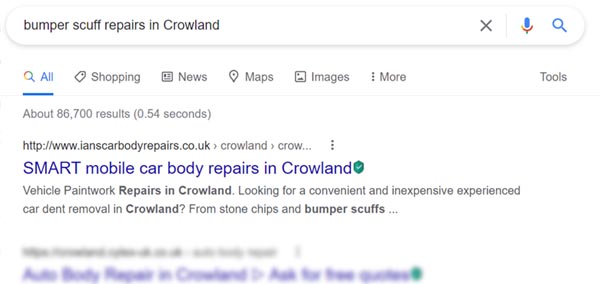Let's consider what opting for the cheapest could mean...
When you ask How much does a website cost?
and start being attracted to the cheapest quotes, be sure that you know what you'll be getting, and be aware that there may be many corners being cut in order to build you that cheap website!
We also want to feel that the things we buy are good value... That the products we buy will work properly and not fall apart, or that the services we pay for are carried out to a good standard.
Value, reliability and quality are not usually what we expect when we shop around for the cheapest, and the same can be said when looking for someone to build you a website.
Less means Less!
The cheapest web designers are likely to be limited in their technical and design skills, as they could be very new to web design and might be doing it for a hobby. That could, of course, be perfect if you’re on a very tight budget and you don't run a business which relies on your website reliably generating enquiries, leads and sales.
Cheap websites are likely to have been built quickly out of necessity, and a low attention to detail and a That will have to do
attitude to getting the job quickly could mean a higher risk of problems, technical errors and design issues. Maybe it looks okay on a laptop but doesn’t work properly on mobile, or maybe some of the most important elements which help websites get found in search results have not been included or set up correctly.
When problems occur, how likely is a cheap web designer to be willing or able to spend the time to investigate and resolve the problems? Problem solving, testing and monitoring takes time, patience and experience, which are rarely top of the list for those web designers who can only attract business by being the cheapest.
Unless the web designer continually produces lots of cheap websites with a quick turnaround so they can move onto the next, and the next, and the next, they might not be able to stay in business for very long, and then what will happen to your website?
So a cheap website might not be the answer
Is saving money on something which is crucial to business success always a good thing? If a cheap and cheerful off the shelf
website is all you need, then you’ll be pleased with the savings you can make. But for most business there is more to it... much more.
To begin with, I don’t see myself as building websites for my clients. That might sound strange, but the users
of these websites are my client’s clients. Therefore understanding who that my client's target audience is should be the focus.
- Who are their customers?
- Where are they?
- How can we reach them?
- What do they need?
- What will their customer want from their website if we can manage to get them to visit it?
Different websites, different needs, different approaches
Of course the purpose of two websites could be very different. Let’s look at a couple of examples:
A website for a racing driver
A racing driver's website is likely to be very visual, stylish, and include a biography, a gallery, news about race results or upcoming race meetings, a list of sponsors with logos and links to their respective websites, and maybe feeds from Twitter or Instagram to keep fans informed.
Whether the driver lives in England, Scotland, Wales or overseas is not relevant, and so competition amongst other websites in search engine results is not really an issue. For example a search for Jake Hill racing driver
should max his website really easy to find.
A website for a plumber
By contrast a website for a plumber will need to provide information about services offered, and where the plumber operates. Information about experience, qualifications, insurances, membership of professional bodies, etc., would provide reassurance that the plumber is reputable, and a portfolio of work would help show the quality that a potential customer could expect.
In addition, the competition in search engine results can be pretty high for a plumber, and so quite a bit of effort will be needed to get their website in front of potential customers. By using phrases within the website’s content such as plumber in Bedford
or boiler installation in Derby
would be taking steps in right direction. But that’s just the start, because besides the actual website itself, additional effort to register their business, services and website with Google by setting up a Google Business Profile would be worthwhile too.
Listen, Understand, Build and Deliver
Let's look at a real example...
I have a client, Ian, who gets in his van each morning and goes to repair cars.
His line of work includes bodywork repairs, bumper scuffs, alloy wheel refurbishments, and car upholstery repairs. He doesn’t change clutches, fuel pumps, brakes or fix suspension problems.
Many of his clients are in and around the Spalding area of south Lincolnshire. Ian would also like to reach out to potential clients in neighbouring towns such as Moulton, Holbeach, Deeping, Crowland, Whaplode, Bourne and Boston.
True, these places fall into the Spalding area of south Lincolnshire
but it doesn’t help his marketing efforts to rely on one page do it all. A bit more effort is needed.
So let’s understand how Ian can attract as many relevant customers as possible.
A one page website fits all - wrong!
Many websites these days, especially those produced on the cheap, consist of just one page. The page may be quite long and provide information about the business, what they do, where they operate, and how to get in touch. But this catch all
approach is unlikely to make the website stand out significantly enough to feature high enough in search engine results to make it worthwhile.
So it could be argued that the money spent on that website, however much or however little that is, has not been put to good use. Worse still, if attracting new customers via a website is critical to business success, the problem is going to be greater than spending or saving a few £100 on an ineffective website.
Anyway, back to Ian.
If I was to publish his website as a single page as a car repairer in Spalding
that would be correct because Ian does repair cars, but it wouldn’t be targeting anyone specifically. It wouldn’t be relevant enough to compete in search engine results against other web pages promoting gearbox replacement in Spalding
or suspension repairs in south Lincolnshire
But although these searches are for car repairs in the right area, they’re not Ian’s target customers anyway. Therefore we need to look at communicating specific services in specific locations.
Targeting customers
Let’s looks at his business again. The services Ian provides include fixing bodywork damage, bumper scuff repairs, stone chips repairs, alloy wheel refurbishments, and car upholstery repairs. In fact he has recently added plastic welding for dashboard repairs to his portfolio.
Ian is also mobile... he travels to the customer instead of them coming to him. So that's another USP to communicate.
The towns and villages he typically works in include Spalding, Moulton, Holbeach, Deeping, Crowland, Whaplode, Bourne and Boston.
So instead of a single catch-all page which is unlikely to attract much business, Ian’s website needs to aim to be as effective as possible for searches such as alloy wheel refurbishment in Holbeach
bumper scuff repairs in Crowland
and mobile car body repairer in Spalding

Landing pages
But hold on a minute. I have listed 8 towns or villages, and 6 different services. Am I suggesting that a separate page for each service and town combination should be produced? 48 pages?
Why not if the time and budget is there, but it would be more sensible to prioritise those combinations which stand a chance of bringing in the most return for any investment in cost and effort.
By the way, having a lot of landing pages besides those pages which are typically visited during the customer journey is not unusual. They can often run into the 1000's.
Adding value
By working with a web designer who is prepared to listen to you to get a better understanding of your business, offer advice to help you target to the right customers, and who is prepared to put in the effort to make it happen without being excessively costly, you’ll be taking the right approach.
This is where adding value
comes in, and why there will always be reasons for professional web designers and web agencies to remain professional and avoid a price race to the bottom, where there is an unhealthy and unsustainable spiral of everyone trying to be cheaper than everyone else.
As a web designer, adding value is the objective. Producing cheap, slow and ineffective websites is not adding value, but you have plenty of choices out there.
Good luck, and if you feel I can help, mail me or give me a call.
Other Web Design Posts
- Do I need a website if I have a Facebook page?
- Why are websites slow?
- Selecting images for web pages
- Websites That Add Value
- Website Builders and Slow Websites
- The Importance of Page Speed
- Web Design Pricing Transparency
- Website Builders
- Responsive Websites
- Do I need a mobile friendly website?
- Web design case study - DHBathrooms

This article was written by Daron Harvey, founder of TargaWeb. Daron is now in his 29th year of professional website design, development, testing and management, including 21 years on the development and management of Hertz multilingual global e-commerce platform.






